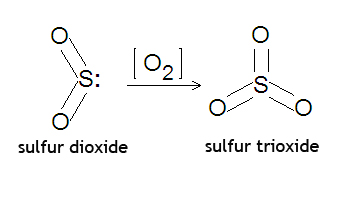Sulfur dioxide: Difference between revisions
imported>Caesar Schinas m (Bot: Update image code) |
mNo edit summary |
||
| (One intermediate revision by one other user not shown) | |||
| Line 1: | Line 1: | ||
{{subpages}} | {{subpages}} | ||
{{Image|Sulfur dioxide trioxide.jpg|right|350px|Conversion of sulfur dioxide to sulfur trioxide.}} | {{Image|Sulfur dioxide trioxide.jpg|right|350px|Conversion of sulfur dioxide to sulfur trioxide.}} | ||
'''Sulfur dioxide''' (also spelled '''sulphur dioxide''') is a [[gas]] (SO<sub>2</sub>) whose [[molecule|molecular]] structure consists of one [[atom]] of [[ | '''Sulfur dioxide''' (also spelled '''sulphur dioxide''') is a [[gas]] (SO<sub>2</sub>) whose [[molecule|molecular]] structure consists of one [[atom]] of [[sulphur]] and two atoms of [[oxygen]]. | ||
It is widely used for the manufacture of sulfuric acid, sulfurous acid and sulfite salts. It is also used as a fruit preservative and it destroys fungi and bacteria. | It is widely used for the manufacture of sulfuric acid, sulfurous acid and sulfite salts. It is also used as a fruit preservative and it destroys fungi and bacteria. | ||
| Line 34: | Line 34: | ||
==References== | ==References== | ||
<references/> | <references/>[[Category:Suggestion Bot Tag]] | ||
Latest revision as of 12:00, 23 October 2024
Sulfur dioxide (also spelled sulphur dioxide) is a gas (SO2) whose molecular structure consists of one atom of sulphur and two atoms of oxygen.
It is widely used for the manufacture of sulfuric acid, sulfurous acid and sulfite salts. It is also used as a fruit preservative and it destroys fungi and bacteria.
Properties and structure
It is a colorless gas with a choking odor. The structure is stabilized by utilizing a transargonic bonding pattern using one 3d electron orbital. The structure includes two double bonds between sulfur and the oxygen atoms, and one lone pair of electrons on the sulfur atom. The length of the double bonds are short, only 1.49 Angstroms, and the O-S-O bond angle is 119.5 degrees.
Synthesis of sulfur dioxide
Sulfur dioxide can be produced from the oxidation of the relatively unstable sulfur monoxide. Thus, SO decomposes exothermically to yield sulfur dioxide
- 16SO(g) → S8(c) + 8SO2 + 311 kJ mole-1
It can also be produced by burning elemental sulfur or a sulfide.
- S + O2 → SO2
- 4FeS2 + 11O2 → 2Fe2O3 + 8SO2
In the laboratory, it can be made by reacting sodium hydrogen sulfide with a strong acid, such as sulfuric acid.
- H2SO4 + NaHSO3 → NaHSO4 + H2O + SO2
The resulting gas product can be purified and dried by bubbling it through sulfuric acid.
Synthesis of other sulfur oxides and acids
Sulfur dioxide is used to make sulfur trioxide, a precursor for sulfuric acid, disulfuric acid, trisulfuric acid and larger sulfur trioxide polymers H(SO3)nH.
- 2SO2(g) + O2(g) → 2SO3(g)
The equilibrium of this reaction is not favorable enough to be used industrially. Instead, surface chemistry using a platinum or vanadium catalyst is used for the commercial production of SO3.
